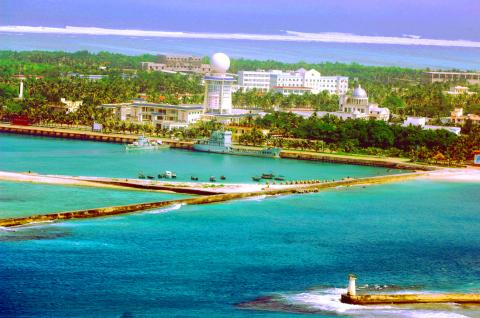In a move that risks increasing regional tensions, China yesterday announced it will invest more than 10 billion yuan (US$1.6 billion) to build infrastructure on disputed islands in the South China Sea and to strengthen marine law enforcement in the region.
Citing Hainan Province Governor Jiang Dingzhi (蔣定之), the Guangzhou-based 21st Century Herald reported that China would build an airport, piers and other important infrastructure on islands administered by Sansha (三沙), a prefecture-level city under Hainan’s jurisdiction that was created in July following approval by the State Council in June.
Located on Woody Island (Yongxing Island, 永興島), the largest island in the Paracels (Xisha Islands, 西沙群島) and 350km southeast of Hainan, Sansha “administers” more than 200 islets, sandbanks and reefs and their surrounding waters in the Spratly Islands (Nansha Islands, 南沙群島), Macclesfield Bank (Zhongsha Islands, 中沙群島) and the Paracel chains.

Photo: AFP
Some of the construction has already begun, the paper said, without providing details.
The Industrial and Commercial Administration Bureau of Hainan Province announced in September that the establishment of Sansha had caught the attention of investors, with the bureau receiving “multiple queries” about setting up businesses in Sansha.
A construction company and a tourism investment company received approval in August and September respectively, Chinese media said.
According to a report in Caijing magazine, officials in Sansha have been evaluating various commercial development plans, including the establishment of a tax haven and casino resorts.
While serving to create facts on the ground to bolster China’s sovereignty claims in the South China Sea, the investment projects have been a source of tension with other claimants, forcing Beijing to add a security component to the project.
In July, China’s Central Military Commission approved the creation of a military garrison on Sansha.
Taiwan, Vietnam, the Philippines, Malaysia and Brunei also have claims to some of the islets. Itu Aba Island (Taiping Island, 太平島), the largest islet in the Spratlys, is controlled by Taiwan.
According to the Herald, Jiang added that in addition to supporting infrastructure, the funds would be used to acquire marine law enforcement vessels and supply ships.
Under new rules announced last month and which are to come into effect on Tuesday next week, police in Hainan will have the authority to board and seize control of foreign ships that “illegally” enter Chinese waters. It remains unclear whether the directive only pertains to coastal areas near Hainan Island or to the entire body of water administered by Sansha.
Chinese media reported at the time that the government would also send new maritime surveillance ships to supplement the fleet responsible for patrolling the South China Sea.
Additional reporting by Bloomberg

CHAOS: Iranians took to the streets playing celebratory music after reports of Khamenei’s death on Saturday, while mourners also gathered in Tehran yesterday Iranian Supreme Leader Ayatollah Ali Khamenei was killed in a major attack on Iran launched by Israel and the US, throwing the future of the Islamic republic into doubt and raising the risk of regional instability. Iranian state television and the state-run IRNA news agency announced the 86-year-old’s death early yesterday. US President Donald Trump said it gave Iranians their “greatest chance” to “take back” their country. The announcements came after a joint US and Israeli aerial bombardment that targeted Iranian military and governmental sites. Trump said the “heavy and pinpoint bombing” would continue through the week or as long

TRUST: The KMT said it respected the US’ timing and considerations, and hoped it would continue to honor its commitments to helping Taiwan bolster its defenses and deterrence US President Donald Trump is delaying a multibillion-dollar arms sale to Taiwan to ensure his visit to Beijing is successful, a New York Times report said. The weapons sales package has stalled in the US Department of State, the report said, citing US officials it did not identify. The White House has told agencies not to push forward ahead of Trump’s meeting with Chinese President Xi Jinping (習近平), it said. The two last month held a phone call to discuss trade and geopolitical flashpoints ahead of the summit. Xi raised the Taiwan issue and urged the US to handle arms sales to

BIG SPENDERS: Foreign investors bought the most Taiwan equities since 2005, signaling confidence that an AI boom would continue to benefit chipmakers Taiwan Semiconductor Manufacturing Co’s (TSMC, 台積電) market capitalization swelled to US$2 trillion for the first time following a 4.25 percent rally in its American depositary receipts (ADR) overnight, putting the world’s biggest contract chipmaker sixth on the list of the world’s biggest companies by market capitalization, just behind Amazon.com Inc. The site CompaniesMarketcap.com ranked TSMC ahead of Saudi Aramco and Meta Platforms Inc. The Taiwanese company’s ADRs on Tuesday surged to US$385.75 on the New York Stock Exchange, as strong demand for artificial intelligence (AI) applications led to chip supply constraints and boost revenue growth to record-breaking levels. Each TSMC ADR represents

State-run CPC Corp, Taiwan (CPC, 台灣中油) yesterday said that it had confirmed on Saturday night with its liquefied natural gas (LNG) and crude oil suppliers that shipments are proceeding as scheduled and that domestic supplies remain unaffected. The CPC yesterday announced the gasoline and diesel prices will rise by NT$0.2 and NT$0.4 per liter, respectively, starting Monday, citing Middle East tensions and blizzards in the eastern United States. CPC also iterated it has been reducing the proportion of crude oil imports from the Middle East and diversifying its supply sources in the past few years in response to geopolitical risks, expanding